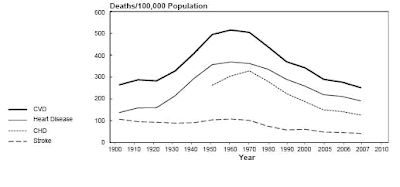Hard times behind fall in heart disease and diabetes in 90s Cuba, says study
Food and petrol shortage caused by collapse of USSR and tighter US embargo led to average weight-loss of 5.5kg in Cuba
... "Marked and rapid reductions in mortality from diabetes and coronary heart disease were observed in Cuba after the profound economic crisis of the early 1990s," the doctors write. "These trends were associated with the declining capacity of the Cuban economy to assure food and mass transportation in the aftermath of the dissolution of the former Soviet Union and the tightening of the US embargo. Severe shortages of food and gas resulted in a widespread decline in dietary energy intake and increase in energy expenditure [mainly through walking and cycling as alternatives to mechanised transportation]."
We've come across these researchers before. Their previous study was cited by campaigners when a tax on fizzy drinks was mooted earlier this year. In fairness to them, they are demanding neither famine nor communism. They have used the example of Cuba because the data are useful for comparing calorie intake, exercise, obesity and disease rates. They do, however, suggest that similar health outcomes could be engineered if governments found a more humane way to bring out mass weight loss.
My problem with their study is that the evidence doesn't really support their conclusion that mild starvation reduced rates of heart disease mortality in Cuba. Their case rests on this graph which shows coronary heart disease morality (red) against obesity (blue). It does appear that rates of heart disease fell within a decade of the obesity rate falling, but this is a significant time lag and it is also apparent that the heart disease rate did not start rising again when obesity surged upwards again (to a record high). There was little or no impact on rates of cancer and stroke.
A further problem is that the researchers don't look at what happened in other countries, ie. they did not use a control. Heart disease has fallen in most developed countries, often sharply, in recent decades for reasons that are not fully understood. And although I would never suggest that there is no relationship between obesity and cardiovascular disease, obesity doesn't seem to be a big enough factor to dictate nationwide rates of CVD mortality.
Here is data from the USA showing CVD morality since 1900. As in many countries, rates peaked in mid-century and then fell steadily.
And here is some obesity data from the USA. I'm sure I don't need to paste these figures together for you to see that there is no correlation between obesity and CVD mortality at the population level. If anything, there is an inverse correlation.
The same is true in the UK, where heart disease rates have fallen at a sharp and steady rate while rates of obesity have risen.
The researchers are on firmer ground when they compare obesity to diabetes—shown below.
Presumably these closer correlations are due to there being fewer risk factors for diabetes than for CVD, and obesity being a more significant risk factor than most. But the claim that Cuba's famine was good for the heart is tenuous and the implication that reducing the average weight of Britons by 5 kilograms would "slash deaths from heart disease by a third" is hard to swallow.







3 comments:
Or it could be that the same thing that causes obesity also causes type-2 diabetes, but doesn't have much impact on CVD. For example, sugar consumption in Cuba seems to about the same level as in the US. (Not that I want to fire the starting pistol on sugar demonisation...)
I suspect it must have something to do with McDonalds. There must be just loads and loads of branches of Mickey D's in Cuba, right?
The average weight loss and decrease in diabetes may be the result of carbohydrate calorie reduction. Even though Cubans got a bigger proportion of calories from carbohydrates, their absolute carbohydrate calorie consumption fell from 1884/day to 1434/day. Had their total calorie intake remained the same, with the deficit made up from fat and protein, they would still most likely have lost a fair bit of weight and been less likely to become diabetic.
I think that we shouldn't discard these data, but remember that they can only be consistent with, or suggest, hypotheses. Which is, as far as I understand it (I'm an engineer), the nature of the game in this sort of thing.
Post a Comment